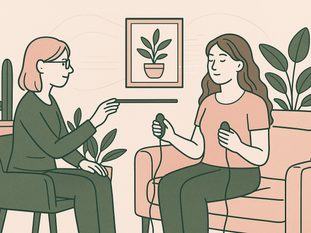265 N Main St. Spanish Fork, UT, 84660
Accepting patients for my waitlist in Utah and Idaho

What If I'm Just Like My Mom? Parenting with a Serious Mental Illness
Aug 14, 2024
3 min read
0
10
0
I’m Afraid I’ll Become My Mom
Early on in my clinical work I treated a woman who I considered an exceptional parent. She often brought her toddler along to sessions and she was incredibly attuned. She had read parenting books and understood behavioral principles. She had principles and ideas around eating, discipline, and sleep that she stuck too. She also frequently expressed deep love for her child. I was shocked when in an early session she state “I’m afraid I’ll become my mom.”
This woman’s mother had been the opposite of her. She had been inconsistent, angry, and often absent. My client had tiptoed around her mothers emotions and spent most of her waking moments focused on keeping her happy when she was home. Other times as a young child she cared for her smaller siblings for days at a time without knowing when her mom would reappear. I expressed my confusion to this client about why she thought she was the same when her actions were so different.
This woman and her mother both had diagnosed bipolar disorder. She knew that this mental illness had been the source of quite a bit of her mom’s erratic behavior. She feared her symptoms would cause her to act the same. The truth she needed to know was that mental illness does not absolve us of accountability for our actions, except in some extreme cases of psychosis. While it is deeply unfair that many good people live with extreme symptoms, we must choose how we manage them.

Parenting with a Serious Mental Illness
Individuals with a serious mental illness can be the best parents. They have to work harder and be more conscious of themselves and their parenting. However, men and women with borderline personality disorder, complex PTSD, narcissistic tendencies, and bipolar, can and have been incredible parents.
Many people assume that because I treat the children of these individuals I hold animosity towards them. The reality could not be less true. Most of the people I treat have similar symptoms to those their parents had. The key difference is that they are willing to work hard to manage those symptoms. Here are some requirements for parenting with a severe mental illness.
Emotional Regulation Skills: Kids are innately dysregulating. We need to be super good at regulating ourselves.
A Good Doctor: Medication can be incredibly helpful and stabilizing. Especially is manic or psychotic episodes are an issue, you need a prescriber that understand you, is responsive, and will be on your side.
A Support System: No parent should go at it alone, that’s especially true for parents with a serious mental illness. Recognizing when you need to drop your kids off with an aunt or a friend for a few hours, and having someone willing to help will save you and them both a lot of grief.
Self Awareness: The better you understand your diagnosis, your triggers, and your behaviors the less harmful they will become.
Hope: If parenting is important to you, you can do it well. Many days will feel overwhelming but your diagnosis does not define your parenting journey.
Therapy: Therapy is one of the best places to get everything above. Your therapist probably knows a good prescriber. They can help you build healthy relationships. They will increase your self awareness and help you learn to regulate your emotions. Shameless plug, at Peaceful River Counseling we're really good at this.

Seeking Help
If you had a parent with a serious mental illness, it’s normal to find parenting very triggering. It’s normal to feel inadequate and often afraid. It’s normal to second guess yourself. It’s normal to worry that you will become your parent. You’re doing better than you think. If you’ve seen yourself in this post, schedule your free 15 minute consult and let’s talk about how parenting can stop being so triggering and start being joyful.








